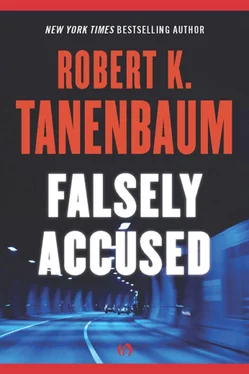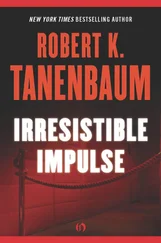Robert Tanenbaum - Falsely Accused
Здесь есть возможность читать онлайн «Robert Tanenbaum - Falsely Accused» весь текст электронной книги совершенно бесплатно (целиком полную версию без сокращений). В некоторых случаях можно слушать аудио, скачать через торрент в формате fb2 и присутствует краткое содержание. Год выпуска: 2010, Издательство: Open Road Integrated Media, Жанр: Криминальный детектив, на английском языке. Описание произведения, (предисловие) а так же отзывы посетителей доступны на портале библиотеки ЛибКат.
- Название:Falsely Accused
- Автор:
- Издательство:Open Road Integrated Media
- Жанр:
- Год:2010
- ISBN:нет данных
- Рейтинг книги:5 / 5. Голосов: 1
-
Избранное:Добавить в избранное
- Отзывы:
-
Ваша оценка:
- 100
- 1
- 2
- 3
- 4
- 5
Falsely Accused: краткое содержание, описание и аннотация
Предлагаем к чтению аннотацию, описание, краткое содержание или предисловие (зависит от того, что написал сам автор книги «Falsely Accused»). Если вы не нашли необходимую информацию о книге — напишите в комментариях, мы постараемся отыскать её.
Falsely Accused — читать онлайн бесплатно полную книгу (весь текст) целиком
Ниже представлен текст книги, разбитый по страницам. Система сохранения места последней прочитанной страницы, позволяет с удобством читать онлайн бесплатно книгу «Falsely Accused», без необходимости каждый раз заново искать на чём Вы остановились. Поставьте закладку, и сможете в любой момент перейти на страницу, на которой закончили чтение.
Интервал:
Закладка:
“Sounds like my kind of guy,” said Marlene lightly. It was the wrong tone; Professor Malkin was giving her a peculiar look, admiration mixed with a horrified avidity. The humor had drained out of her face. Marlene had to look away. She wants me to kill them, thought Marlene, and imagined what it would be like to spend all one’s time as the clerk in the abbatoir, the keeper of the rolls in our mild, domestic Belsen, immersed in case histories, in the horror stories of implacable men, of perverted love, of tortured and slaughtered women. Kill them all. Marlene did not have to plumb too deeply to reach those same feelings; she had to suppress a shudder.
“There’s somebody I think you should meet,” Malkin was saying as Marlene snapped back to attention. “If you’re going to be a crusader, you should meet the others.” She riffled through a Rolodex and wrote something on an index card.
“I didn’t know there were others,” said Marlene, taking the card. “And I’m not sure I’m a crusader.” The name on the card was Mattie Duran, and the address was the East Village Women’s Shelter, on Avenue B.
“You and Mattie should have a lot to talk about,” said Malkin confidently. “She’s quite a character. They call her the Durango Kid.”
When Marlene left the professor’s office and walked out into Washington Square, she was thinking that Professor Malkin probably considered Marlene quite a character too. A wave of regret passed over her, and she suddenly felt ridiculous: her outfit, her recent activities, her plans, all seemed at that moment absurd. She cursed under her breath, put her head down and her hands in her pockets, and strode off down the street, kicking the damp piles of fallen leaves. Respectable people moved out of her way.
Karp said, “Would you please state your name for the record?”
“You know who I am,” said the district attorney, Sanford Bloom. He smiled his famous perfect smile at his lawyer. His lawyer smiled too. Bloom’s lawyer was named Conrad Wharton, and he smiled with the purse-lipped pucker of an old-fashioned kewpie doll, which, with his puff of colorless hair and round pink face, he disturbingly resembled. He was not a particularly good lawyer (it was Karp’s opinion that the D.A. would not know a good lawyer if one bit him on the ass), but Wharton had once been Bloom’s administrative chief and hatchet man, and Bloom, for whatever reason, trusted him. Besides that, Wharton probably disliked Karp with an intensity greater than that of any other person in the state of New York, not excluding the several score people Karp had sent to Attica for murder. Karp thought that this was a big part of why Bloom had chosen Wharton. He wanted to piss Karp off. He wasn’t taking this deposition or the case very seriously.
Karp repeated the question calmly and got the same answer. He said, “Mr. Wharton, tell your client that if he doesn’t give me his name, I will leave these proceedings right now and go over to Judge Craig and get an order requiring him to do so, and when the press asks me what’s going on, I’ll tell them that the D.A. required a court order to reveal his name.”
Bloom rolled his eyes at Wharton and said, “Sanford L. Bloom.”
“Thank you,” said Karp, and swore him in. The stenographer’s keys clattered. Karp handed Bloom a Xerox of the letter Bloom had written to the Mayor. “I give you a letter dated June twentieth of this year. It’s addressed to the Mayor and signed by you. Did you write it?”
“Yes, of course I did,” said Bloom after glancing at the document.
Karp consulted his notes and began with the most inflammatory charge. “In this letter you state that in late May of this year Assistant District Attorney James Warneke apprised you of deficiencies in the performance of the chief medical examiner, the present plaintiff, Dr. Selig, in reference to a homicide case, People v. Lotz, to wit: that he had failed to properly supervise the person who made the initial examination; that he had lost certain evidence in the case and threw other evidence away; that he altered the logbook at the morgue to conceal this; and finally, that he made remarks of an unprofessional nature, insulting to the dead victim in this case, namely that a positive acid phosphatase test performed on the victim’s vaginal secretions might not have been the result of seminal fluid but of snails. Mr. Warneke told you that Dr. Selig had said, quote, maybe she put snails up her vagina, unquote. Is that substantially correct?”
“Yes. That’s what’s in the letter.”
“Good. When Mr. Warneke conveyed all this to you, what action did you take?”
“Action?” asked the D.A.
“Yes. These were serious charges against a prominent official. Did you investigate them to see if they were true?”
Whispered consultation with Wharton. Bloom said, “I had no reason to doubt the report of Mr. Warneke.”
“Did you confront Dr. Selig with these charges?”
“No.”
“Why not?”
“I was not under any obligation to do so. And besides, Dr. Selig was often arrogant and dismissive when confronted with the failings of his office.”
Karp felt a stirring to his right. Murray Selig was getting steamed.
“Was he arrogant and dismissive to you personally, at face-to-face meetings?” Karp asked.
This required a consultation too, after which Bloom said, “Not to me personally, no, but to my people.”
“To Warneke?”
“No, Davis.”
“Oh, you’re referring to Miss Marsha Davis, the A.D.A. in People v. Ralston? ”
“Yes.”
“I see. Now, according to Mr. Warneke’s deposition, which we have already taken, he brought these charges to your attention on May twenty-eighth of this year. Is that correct?”
“Yes, around about there.”
“All right. Referring now to the charges in the letter regarding the People v. Ralston case, Miss Davis accuses Dr. Selig of not making himself available to her in this case, of being late for a trial, although she gave him-what was it? — four weeks’ notice of the trial date, and also that on one occasion when she went to visit him in his office, he humiliated her in front of another gentleman. Is that what you meant by Dr. Selig’s arrogant and dismissive attitude?”
“Yes, that’s an example.”
“I see. But according to Miss Davis’s sworn deposition, you were not informed of these problems until mid-June at the earliest. Yet you still declined to investigate Mr. Warneke’s serious charges of late May, because Dr. Selig was arrogant and dismissive? Is that correct?”
The district attorney huffed and made an impatient gesture with his hand. “The details of when somebody came to me about this or that problem are not the point. It was well known that there were plenty of problems.”
“Was it?” asked Karp, leafing through a folder on the table. “I give you a copy of a letter dated February 11, commending Dr. Selig for the timely and expert assistance of his office in several difficult cases. It’s signed by you. Do you recall this letter?”
“I sign a lot of things,” said Bloom. He did not look at the letter.
“I’m sure you do. Can you account for the deterioration of Dr. Selig’s performance from exemplary in February to incompetent and worthy of dismissal in late May and early June?”
“I have no way of answering that.”
“Are you familiar with the letter written to the Mayor by the commissioner of Health, Dr. Angelo Fuerza, dated June fifth, containing a number of complaints about Dr. Selig’s performance?”
“I’ve seen it.”
“Did you at any time meet with Dr. Fuerza and the Mayor with the purpose of developing a case against Dr. Selig?”
Читать дальшеИнтервал:
Закладка:
Похожие книги на «Falsely Accused»
Представляем Вашему вниманию похожие книги на «Falsely Accused» списком для выбора. Мы отобрали схожую по названию и смыслу литературу в надежде предоставить читателям больше вариантов отыскать новые, интересные, ещё непрочитанные произведения.
Обсуждение, отзывы о книге «Falsely Accused» и просто собственные мнения читателей. Оставьте ваши комментарии, напишите, что Вы думаете о произведении, его смысле или главных героях. Укажите что конкретно понравилось, а что нет, и почему Вы так считаете.












